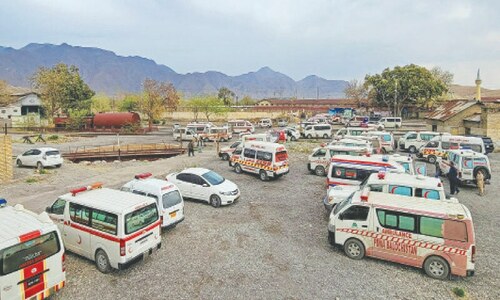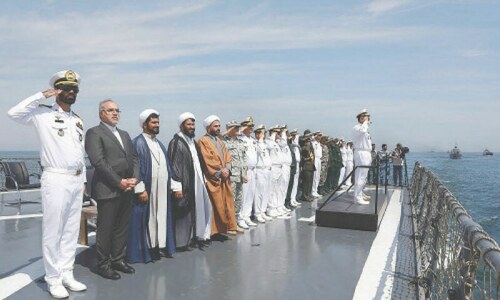
KARACHI: “A poster, a simple, arresting image combined by a powerful piece of text, can be a force for change,” believes Poster For Tomorrow, a community of artists who came together in 2009 to make visual displays, in specific posters, a primary medium of activism.
In 2015 a basic human right was once again selected to be addressed in their annual exhibition, and thousands of entries from over five continents saw posters designed to depict the right to health care. The T2F on Thursday opened its doors for the public to view the top 100 posters shortlisted this year.
In previous years the themes have varied; from the abolition of the death penalty, the right to education, as well as the universal right to fair employment, all have aimed to create awareness of injustice around the world.
This year’s exhibition raises awareness of the necessity of health care and the unfortunate reality of the limits of its accessibility.
The exhibit had several colourful posters, however, the message they delivered was very bleak. With health care a basic human right, the reality on ground is far from ideal. Harrowing statistics highlight the disparity between the haves and the have nots with regards to medical services, sanitation, adequate food to eat and clear water to drink.
The minimalistic backdrop allowed the message about lack of access to health care to be further amplified and be a commentary on society by highlighting uncomfortable truths.
Sanctions and wars was one such truth that was depicted in several posters. Representing Iran, Dariush Allahyari’s poster was among the top 10 from 4,980 original submissions. With Iran at the receiving end of sanctions for several decades, the simple statement of Allahyari’s poster reads “Sanctions are silent war.” The image of two white pills attached to ammunition used in warfare is hard-hitting.
Eva Chan from Belgium, also among the top 10, designed a poster of a maze with the emergency department of a hospital smack in the middle. “We’re Not All Well-Born in the Maze” is the accompanying statement, as if mocking those who design health care services similar to a never-ending maze that the disadvantaged cannot escape from.
And who constitute the disadvantaged, one may ask? According to Dr Zsuzsanna Jakab, World Health Organisation Regional director for Europe, “the differences within and between countries — in income levels, opportunities and health status — are greater today than at any time in recent history.”
She also shared how the contributions of Poster for Tomorrow are pertinent in today’s era. “These posters excellently illustrate the inequalities in health and delivery of health services. It has become necessary to undertake a joint effort involving all government sectors, international organisations, professionals, civil society and individuals to achieve health and well-being for all.”
Wolfgang Steinbauer’s from Austria designed a poster which depicts a white pill representing the world and reads “Equal Health Care”. The distinct line in the middle of the pill is labelled as the Equator; the northern side of the pill is intact and very much representative of the first world with clean water, and access to health and education. However, the southern side of the pill, which represents countries south of the Equator is depicted to be dissolving away, cracked, and a true reflection of the inequality between the first and the third world.
This year three Pakistanis are part of the online jury — Durriya Kazi, Khuda Bux Abro and Hiba Siddiqui. Unfortunately, there were no poster entries representing Pakistan, an unfortunate omission. At last year’s exhibit, on the theme of universal right to fair employment, Sara Nisar’s “Understand the Difference” came in at 91 which took a bold stand against child labour.
Renowned human rights and peace activist Prof S. Haroon Ahmed, also a doctor and psychiatrist, was present to inaugurate the exhibition. He spoke about how health care around the world is “becoming costlier everyday and no longer is the medical profession a noble profession as it has become a business and many can no longer afford it”.
The Posters for Tomorrow exhibition will continue till Dec 13, from 11am to 7pm.
Published in Dawn, December 11th, 2015













































